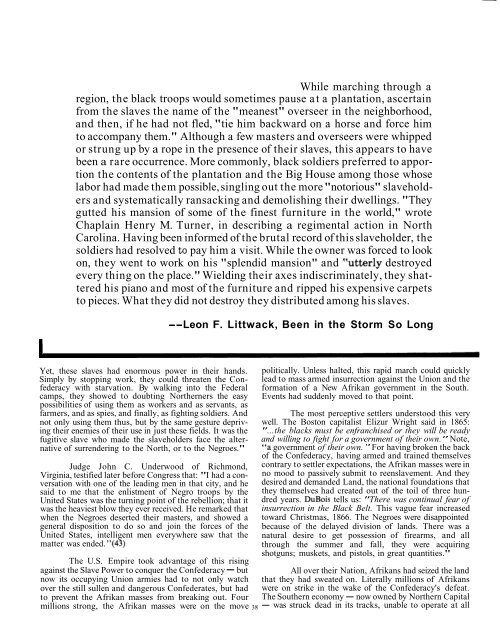Settlers - San Francisco Bay Area Independent Media Center
Settlers - San Francisco Bay Area Independent Media Center
Settlers - San Francisco Bay Area Independent Media Center
Create successful ePaper yourself
Turn your PDF publications into a flip-book with our unique Google optimized e-Paper software.
While marching through a<br />
region, the black troops would sometimes pause at a plantation, ascertain<br />
from the slaves the name of the "meanest" overseer in the neighborhood,<br />
and then, if he had not fled, "tie him backward on a horse and force him<br />
to accompany them." Although a few masters and overseers were whipped<br />
or strung up by a rope in the presence of their slaves, this appears to have<br />
been a rare occurrence. More commonly, black soldiers preferred to apportion<br />
the contents of the plantation and the Big House among those whose<br />
labor had made them possible, singling out the more "notorious" slaveholders<br />
and systematically ransacking and demolishing their dwellings. "They<br />
gutted his mansion of some of the finest furniture in the world," wrote<br />
Chaplain Henry M. Turner, in describing a regimental action in North<br />
Carolina. Having been informed of the brutal record of this slaveholder, the<br />
soldiers had resolved to pay him a visit. While the owner was forced to look<br />
on, they went to work on his "splendid mansion" and "utterly destroyed<br />
every thing on the place." Wielding their axes indiscriminately, they shattered<br />
his piano and most of the furniture and ripped his expensive carpets<br />
to pieces. What they did not destroy they distributed among his slaves.<br />
--Leon F. Littwack, Been in the Storm So Long<br />
Yet, these slaves had enormous power in their hands.<br />
Simply by stopping work, they could threaten the Confederacy<br />
with starvation. By walking into the Federal<br />
camps, they showed to doubting Northerners the easy<br />
possibilities of using them as workers and as servants, as<br />
farmers, and as spies, and finally, as fighting soldiers. And<br />
not only using them thus, but by the same gesture depriving<br />
their enemies of their use in just these fields. It was the<br />
fugitive slave who made the slaveholders face the alternative<br />
of surrendering to the North, or to the Negroes."<br />
Judge John C. Underwood of Richmond,<br />
Virginia, testified later before Congress that: "I had a conversation<br />
with one of the leading men in that city, and he<br />
said to me that the enlistment of Negro troops by the<br />
United States was the turning point of the rebellion; that it<br />
was the heaviest blow they ever received. He remarked that<br />
when the Negroes deserted their masters, and showed a<br />
general disposition to do so and join the forces of the<br />
United States, intelligent men everywhere saw that the<br />
matter was ended. "(43)<br />
The U.S. Empire took advantage of this rising<br />
against the Slave Power to conquer the Confederacy - but<br />
now its occupying Union armies had to not only watch<br />
over the still sullen and dangerous Confederates, but had<br />
to prevent the Afrikan masses from breaking out. Four<br />
millions strong, the Afrikan masses were on the move 38<br />
politically. Unless halted, this rapid march could quickly<br />
lead to mass armed insurrection against the Union and the<br />
formation of a New Afrikan government in the South.<br />
Events had suddenly moved to that point.<br />
The most perceptive settlers understood this very<br />
well. The Boston capitalist Elizur Wright said in 1865:<br />
"...the blacks must be enfranchised or they will be ready<br />
and willing to fight for a government of their own. " Note,<br />
"a government of their own. " For having broken the back<br />
of the Confederacy, having armed and trained themselves<br />
contrary to settler expectations, the Afrikan masses were in<br />
no mood to passively submit to reenslavement. And they<br />
desired and demanded Land, the national foundations that<br />
they themselves had created out of the toil of three hundred<br />
years. DuBois tells us: "There was continual fear of<br />
insurrection in the Black Belt. This vague fear increased<br />
toward Christmas, 1866. The Negroes were disappointed<br />
because of the delayed division of lands. There was a<br />
natural desire to get possession of firearms, and all<br />
through the summer and fall, they were acquiring<br />
shotguns; muskets, and pistols, in great quantities."<br />
All over their Nation, Afrikans had seized the land<br />
that they had sweated on. Literally millions of Afrikans<br />
were on strike in the wake of the Confederacy's defeat.<br />
The Southern economy - now owned by Northern Capital<br />
- was struck dead in its tracks, unable to operate at all

















